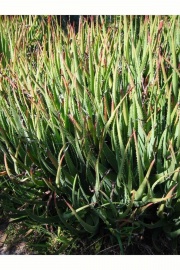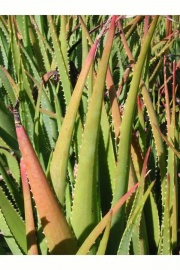Difference between revisions of "Aloes"
m (Text replace - "== Authority ==" to "== Sources Checked for Data in Record ==") |
|||
| (2 intermediate revisions by the same user not shown) | |||
| Line 1: | Line 1: | ||
| − | [[File:aloesuccotrinaPD2.jpg|thumb|Fynbos aloe | + | [[File:aloesuccotrinaPD2.jpg|thumb|Fynbos aloe ''Aloe succotrina'']] |
| − | |||
| − | ''Aloe succotrina'']] | ||
== Description == | == Description == | ||
| − | The juice from the Aloe genus of plants characterized by their spiny leaves. Examples of these lily-like plants include: Aloe vera (True aloe or common aloe); Aloe vulgaris (Barbados aloes), ''A.sinuta, A. socotrina'' (Socotrine or Bombay aloes), and ''A. capensis'' (Cape aloes). Heating the juice produces a thick, dark brown resin that has been used as a varnish to protect gilding. Aloes has also been heated to dryness to produce a brown residue that is ground to form a pigment. It contains barbaloin and small amounts of the C-glycoside of aloe-emodin (White 1986). Aloes was also used as a dye forming a yellowish brown color on wool or pale gray on cotton with an alumina mordant. | + | The juice from the Aloe genus of plants characterized by their spiny leaves. Examples of these lily-like plants include: ''Aloe vera'' (True aloe or common aloe); ''Aloe vulgaris'' (Barbados aloes), ''A.sinuta, A. socotrina'' (Socotrine or Bombay aloes), and ''A. capensis'' (Cape aloes). Heating the juice produces a thick, dark brown resin that has been used as a varnish to protect gilding. Aloes has also been heated to dryness to produce a brown residue that is ground to form a pigment. It contains barbaloin and small amounts of the C-glycoside of aloe-emodin (White 1986). Aloes was also used as a dye forming a yellowish brown color on wool or pale gray on cotton with an alumina mordant. |
| − | [[File:aloesuccotrinaPD1.jpg|thumb|Fynbos aloe | + | [[File:aloesuccotrinaPD1.jpg|thumb|Fynbos aloe ''Aloe succotrina'']] |
| − | |||
== Synonyms and Related Terms == | == Synonyms and Related Terms == | ||
| − | socotrine aloes; hepatic aloes; Caballine aloes; Aloe vera (True aloe or common aloe); Aloe vulgaris (Barbados aloes); ''A.sinuta; A. socotrina'' (Socotrine or Bombay aloes); ''A. capensis'' (Cape aloes). | + | socotrine aloes; hepatic aloes; ''Caballine aloes''; ''Aloe vera'' (True aloe or common aloe); ''Aloe vulgaris'' (Barbados aloes); ''A.sinuta; A. socotrina'' (Socotrine or Bombay aloes); ''A. capensis'' (Cape aloes). |
== Other Properties == | == Other Properties == | ||
| − | Soluble in hot water, alcohol, ether and essential oils. | + | * Soluble in hot water, alcohol, ether and essential oils. |
| − | + | * Aloe has a bitter flavor and strong odor. | |
| − | Aloe has a bitter flavor and strong odor. | + | * Refractive Index = 1.619 |
| − | |||
| − | |||
| − | |||
| − | |||
| − | |||
| − | |||
| − | |||
| − | |||
| − | + | ==Resources and Citations== | |
| − | + | * R.White "Brown and Black Organic Glazes, Pigments and Paints" ''National Gallery Technical Bulletin'', 10:58-71, 1986. | |
| − | * Wikipedia | + | * Wikipedia: Aloe: species list at http://en.wikipedia.org/wiki/List_of_Aloe_species |
* G.S.Brady, ''Materials Handbook'', McGraw-Hill Book Co., New York, 1971 Comment: p. 671 | * G.S.Brady, ''Materials Handbook'', McGraw-Hill Book Co., New York, 1971 Comment: p. 671 | ||
| − | * ''Encyclopedia Britannica'', http://www.britannica.com Comment: Aloe" | + | * ''Encyclopedia Britannica'', http://www.britannica.com Comment: Aloe" [Accessed May 8, 2003]. |
* ''Dictionary of Building Preservation'', Ward Bucher, ed., John Wiley & Sons, Inc., New York City, 1996 | * ''Dictionary of Building Preservation'', Ward Bucher, ed., John Wiley & Sons, Inc., New York City, 1996 | ||
Latest revision as of 09:04, 26 April 2022
Description
The juice from the Aloe genus of plants characterized by their spiny leaves. Examples of these lily-like plants include: Aloe vera (True aloe or common aloe); Aloe vulgaris (Barbados aloes), A.sinuta, A. socotrina (Socotrine or Bombay aloes), and A. capensis (Cape aloes). Heating the juice produces a thick, dark brown resin that has been used as a varnish to protect gilding. Aloes has also been heated to dryness to produce a brown residue that is ground to form a pigment. It contains barbaloin and small amounts of the C-glycoside of aloe-emodin (White 1986). Aloes was also used as a dye forming a yellowish brown color on wool or pale gray on cotton with an alumina mordant.
Synonyms and Related Terms
socotrine aloes; hepatic aloes; Caballine aloes; Aloe vera (True aloe or common aloe); Aloe vulgaris (Barbados aloes); A.sinuta; A. socotrina (Socotrine or Bombay aloes); A. capensis (Cape aloes).
Other Properties
- Soluble in hot water, alcohol, ether and essential oils.
- Aloe has a bitter flavor and strong odor.
- Refractive Index = 1.619
Resources and Citations
- R.White "Brown and Black Organic Glazes, Pigments and Paints" National Gallery Technical Bulletin, 10:58-71, 1986.
- Wikipedia: Aloe: species list at http://en.wikipedia.org/wiki/List_of_Aloe_species
- G.S.Brady, Materials Handbook, McGraw-Hill Book Co., New York, 1971 Comment: p. 671
- Encyclopedia Britannica, http://www.britannica.com Comment: Aloe" [Accessed May 8, 2003].
- Dictionary of Building Preservation, Ward Bucher, ed., John Wiley & Sons, Inc., New York City, 1996
- F. Crace-Calvert, Dyeing and Calico Printing, Palmer & Howe, London, 1876 Comment: p.278
- CRC Handbook of Chemistry and Physics, Robert Weast (ed.), CRC Press, Boca Raton, Florida, v. 61, 1980 Comment: ref. index=1.619

